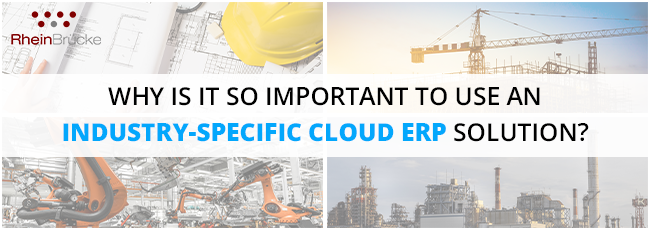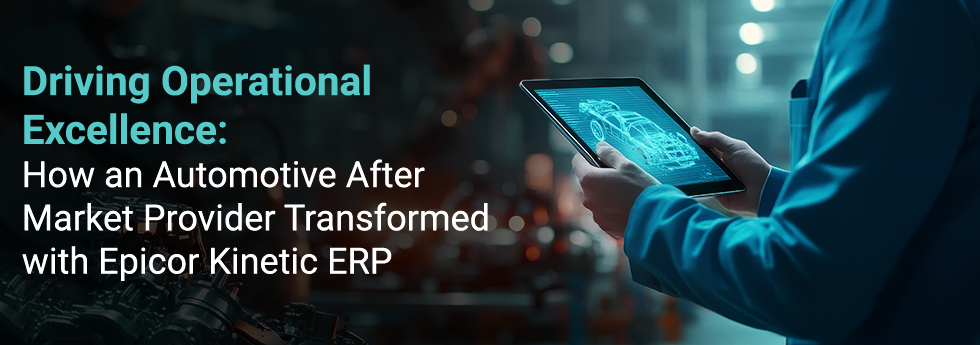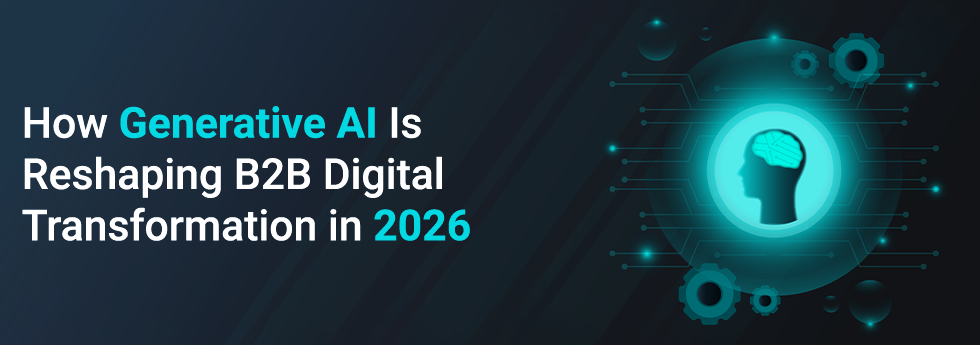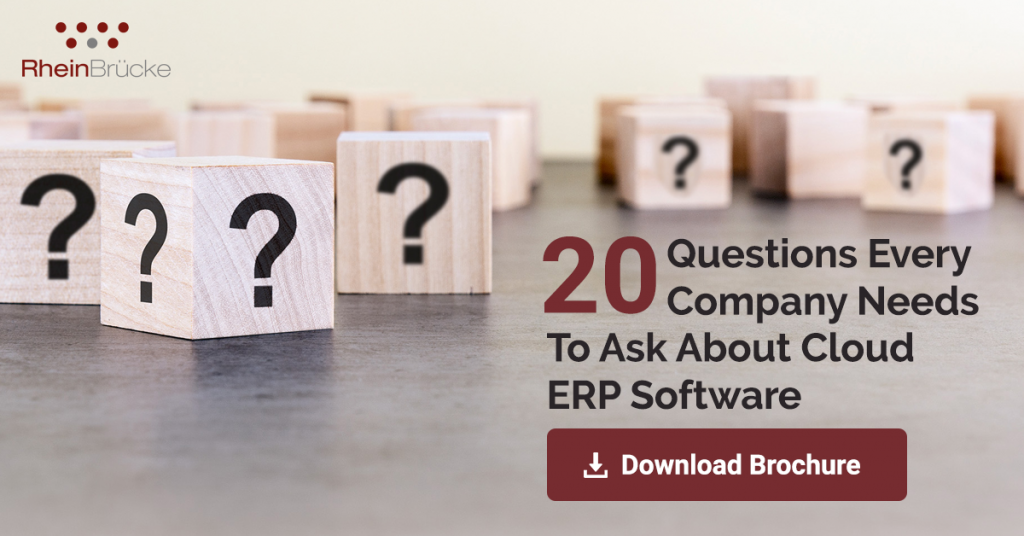
With technology playing an important role in our everyday business activities, investing in the right ERP software for your organization is a significant and long-term decision. According to research, the cloud ERP market itself is expected to expand from $53 million in 2021 to $277 million by 2032.
ERP software which was originally installed on office spaces in case of on-premise ERP and was exclusively offered to enterprises with a significant capital expenditure is now easily accessible on web browsers with a minimum monthly subscription by using a cloud solution and organizations are increasingly choosing Cloud ERP systems. Many factors contribute to this sudden shift in the adoption of Cloud-based ERP software, including the need to focus on the primary business objectives such as business continuity, resilience, etc. rather than just IT processes. Choosing the best Cloud ERP system will help you meet your existing business requirements as well as help you to adapt easily to the changing needs in the future.

However, not every business follows the same road or progresses at the same rate. Hence in the case of ERP systems, it’s not always a one size fits all or generic ERP. Different industries have different business requirements and objectives from their ERP systems. Hence, for some businesses a generic ERP solution can get the job done, companies in certain industries may be better off with ERP solutions designed as per your industry and operational requirements , commonly known as Industry Specific ERP Solutions.

What is the difference between a generic ERP and an industry-specific Cloud ERP?

Generic ERP
A generic ERP software comes with a “one size fits all” approach. Such ERPs usually consist of all the basic elements required to integrate a variety of different business segments and workflows from standard purchase order management to accounting and Human Resource to sales management. It’s ideal for new businesses that need assistance with all aspects of their business operations.
However, configuring your system for your specific business processes with a generic ERP isn’t a simple process. Almost every business will require some customization of a standard ERP system which is time-consuming and expensive. For example, if you are using a generic ERP for the manufacturing industry, the software may handle basic finances and order processing, but it might overlook inventory tracking, business intelligence, and production issues in the absence of customization. In such cases, you’ll need to buy add-ons for your system to perform according to your business requirements. And for this, you’ll most likely be spending your resources on unnecessary and complicated features that won’t be utilized.
So, what is the best way to deal with such customization challenges? The answer is an Industry-Specific Cloud ERP solution!
Industry-Specific Cloud ERP

According to a survey report by Panorama Consulting, 67% of the executives claimed that industry-specific capabilities were an important factor in their ERP selection criteria. As the name implies, industry-specific ERP systems are tailored to a single industry. Industry vertical ERP software is designed by recognizing the complex requirements of any given industry, such as manufacturing, retail, construction, interior design, food & beverage, eCommerce, etc.
When a vendor or a Cloud ERP software provider builds an industry-specific ERP system, they fully understand the complexities of that sector and what is necessary to improve its business operations. Such systems offer integrated solutions for business processes based on the industry best practices so that you don’t need any customization at the time of applying ERP implementation best practices. Moreover, having an ERP specialized in a particular industry provides businesses a competitive advantage as well. Therefore, for companies looking to find the ERP that best-fits for their industry best practices and business processes and want to ensure faster returns on investment from their ERP initiatives, an industry-specific cloud-ERP system that provides the functionality to plug & play the system anytime and from anywhere is an ideal choice.
Benefits of Industry-Specific Cloud ERP
Despite having modules to handle tasks performed across many sectors, generic ERP systems lack the essential features that are specific to a given industry. These gaps are efficiently filled by the industry-specific ERP solutions, which also provide you access to automated systems and optimized workflows. The following points briefly summarise the main benefits of industry-specific cloud ERPs:
1. Minimum time required for implementation
The implementation process can be performed quickly as most of the critical features for business operations for the specific industry are already available in the system.
2. Integration with other modules
An industry-specific ERP is also mindful of the important integrations and API interfaces that are required with other critical modules like BI (Business intelligence), FSM (Field service management) etc.
3. Enhanced reporting
The reporting capabilities of such ERPs are designed to provide practical business insights that can guide your decision-making processes.
4. Cost-effective
With an ideal industry-specific Cloud ERP solution, you no longer need to pay additional fees for add-on modules software licensing and pay for other unwanted features. Instead, it allows you to pay a manageable fixed monthly charge while avoiding extra infrastructure expenditures thereby minimizing the maintenance and support expenses.
5. Get industry-specific expertise from your vendor
One of the biggest advantages of an industry-specific solution is having a vendor like Epicor Cloud ERP Solutions, whom you can rely on, and who is knowledgeable about your software and business when you need them most.
6. Secured data
Digital data protection and resist cyberattacks on the company’s server are completely competent with an industry-specific Cloud ERP solution. Such cloud solutions also provide a data recovery framework that runs continuously in case of emergencies.
7. Scalability
Some of the best Cloud-based ERP Solutions for SMB’s built for your sector will provide you the opportunity to begin with the features you require immediately and add additional functionalities and cutting-edge technologies as your company expands. An industry-specific ERP also helps businesses to quickly adapt to changing worldwide regulatory and compliance requirements.
Industry-specific Cloud ERPs from RheinBrücke
Every industry is unique in its way, be it its business model, processes, products, size, target market, or distribution strategy. RheinBrücke offers industry templates solutions based on Epicor for sevral industries including Manufacturing, Engineering, Procurement & Construction, Interior Design, Distribution & Retail, etc. So, let’s explore some of the key industry verticals that are supported by industry-specific ERPs:
1. ERP for Manufacturing Industry

A manufacturing-specific ERP may serve as an integrated system for managing all business activities from the shop floor to the top floor, including maintaining resources, managing production, planning and scheduling, monitoring inventory levels, reporting, sales and purchases, accounting, finance, and many more. Modern Cloud-based ERP Systems for Manufacturing are integrated with BI (Business intelligence) and IoT for shop floor efficiency and advanced AI technologies that can monitor production processes and equipment can be used to convey alarms on issues with any process, preventive maintenance, etc. An ERP system tailored for the manufacturing industry helps manufacturers of all sizes achieve greater ROI than a generic ERP.
The Manufacturing processes involved in discrete manufacturing and process manufacturing companies differ a lot, and hence the ERP requirements too.
Cloud ERP for Discrete Manufacturing needs to be able to deal with manufacturing process of similar goods replicated via an assembly line. It should have features for managing bill of materials, handling quality issues, should integrate with product lifecycle management applications, etc. EPICMake from RheinBrücke is a ready-to-deploy industry vertical template solution for Discrete Manufacturing based on Epicor ERP. It is a complete ERP solution that meets your inventory management, planning, scheduling, and production needs. The system includes Epicor ERP’s sophisticated capabilities, RheinBrücke’s extensive discrete manufacturing sector experience, and the benefits of the Cloud.

On the other hand, Process Manufacturing Software is used for handling processes that demand more complex activities for transforming raw materials into a finished product that cannot be disintegrated to its original constituency. The requirements differ a lot. It should have more capabilities to handle formulas, manage co-products and by-products formed during the manufacturing process, etc.
Built on the Epicor ERP platform, EPICProcess is a template solution from RheinBrücke for the process manufacturing industry. It is specially designed to address the recipe-based production needs of different processes used in standard or mixed-mode manufacturing industries like chemical, pharmaceutical, food and beverage, paints and coatings, etc.

Being the largest Epicor ERP Implementation partner in EMEA region, RheinBrücke also offers ERP Solutions for Manufacturing sub-verticals such as ERP for Furniture industry, automotive manufacturing industry, Cable Manufacturing, industrial machinery and fabricated metal industry, etc.
2. ERP for Construction and EPC Industries
Since most construction enterprises operate across different states or countries, while having their construction units at different places, a centralized system is required to keep all data secured in one place, making the function of a Cloud-based ERP for Construction Manufacturing particularly important in these sectors.
An ERP for Construction industry or Engineering, Procurement and Construction companies helps businesses in these sectors to improve their processes such as inventory and labor management, asset management, project estimation, budget planning, resource scheduling, contract management, etc, to gain optimum results.
EPICBuild by RheinBrücke is a tailor-made solution for managing all parts of your EPC company, from subcontractors to material outsourcing assignments, and from plant management to mobile assets and field labor. It provides increased visibility and efficiency throughout your projects.

3. ERP for Distribution Industry

Using a Distribution-Specific ERP software, you can manage overall transportation logistics, enable demand forecasting, and maintain OTIF(on-time, in-full) regulatory standards, while keeping track of the inventory levels in a Just-in-time environment also.
RheinBrücke’s ERP Solution for Distribution, built on the Epicor ERP platform, provides a comprehensive range of functionalities to address the needs of the distribution industry, including order management, SCM, warehouse management, CRM, SRM, finance and account management, and much more, to encourage economic growth of the company with easy implementation and expansion, regardless of the size or variability of your distribution network.
4. ERP for Interior Design Industry

An ERP for Interior Design unifies and integrates key functions of Interior Fitout companies like planning, designing, and modeling, allocating interior designers, adding expenditures while tracking budget, maintaining invoices, scheduling appointments, etc. It enables the organizations to finish projects efficiently with the maximum possible profit margins.
RheinBrücke’s EPICDesign is a cloud-based, pre-configured, and scalable solution that assists Interior Fitout Contractors in eliminating the need for traditional paperwork and spreadsheets for maintaining breakdowns and projections thereby providing you real-time control over your activities through centralization and automation.

Conclusion
Now that, when we have a clear understanding of the differences between generic and industry-specific, there’s no denying that the advantages of industry-specific cloud ERP are self-evident!
With the extra benefit of providing you with faster, more agile solutions that are simpler to implement and more flexible than other solutions, an industry-specific cloud ERP can support your company to succeed in today’s demanding business environment.
The choice is entirely your’s, as to whether you want to get a specialist or a generalist. Take a call if you want to pay big bucks for a big-name ERP with unnecessary features or you want to make use of smart tools and modules that works especially for your business by investing in an industry-specific Cloud ERP Solution.
A specialist is preferable at anytime rather than a generalist!!
Want to know more about industry-specific Cloud ERPs? Feel free to contact us.




